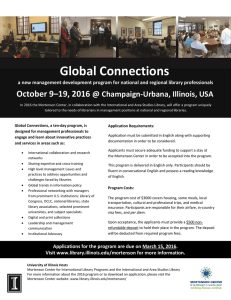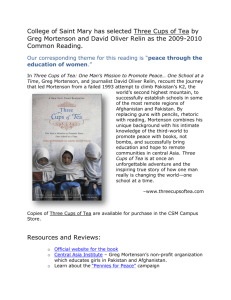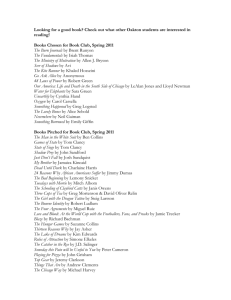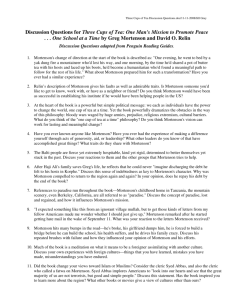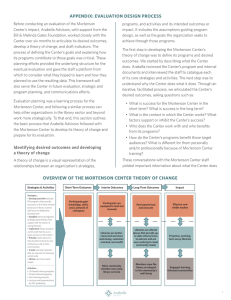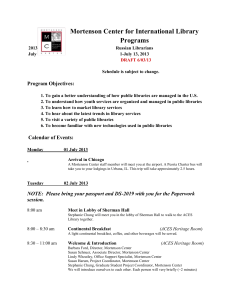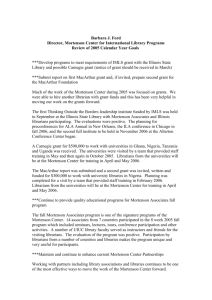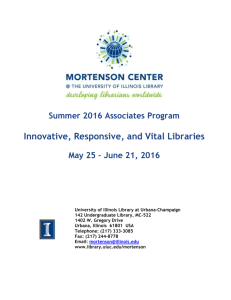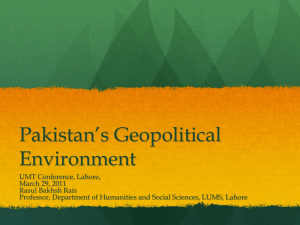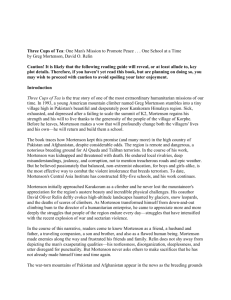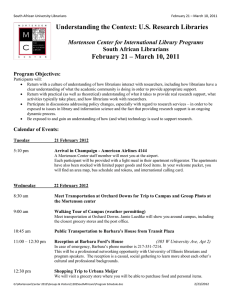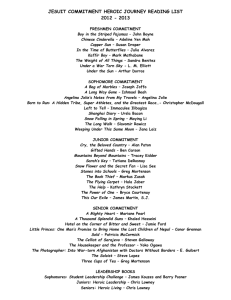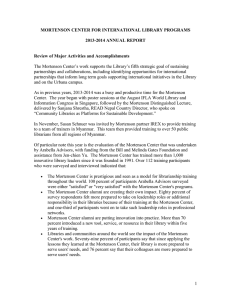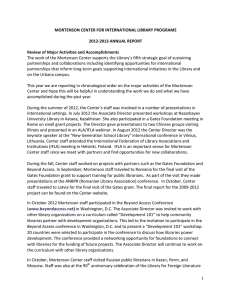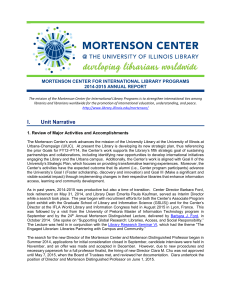to read further (Microsoft Word Document)
advertisement
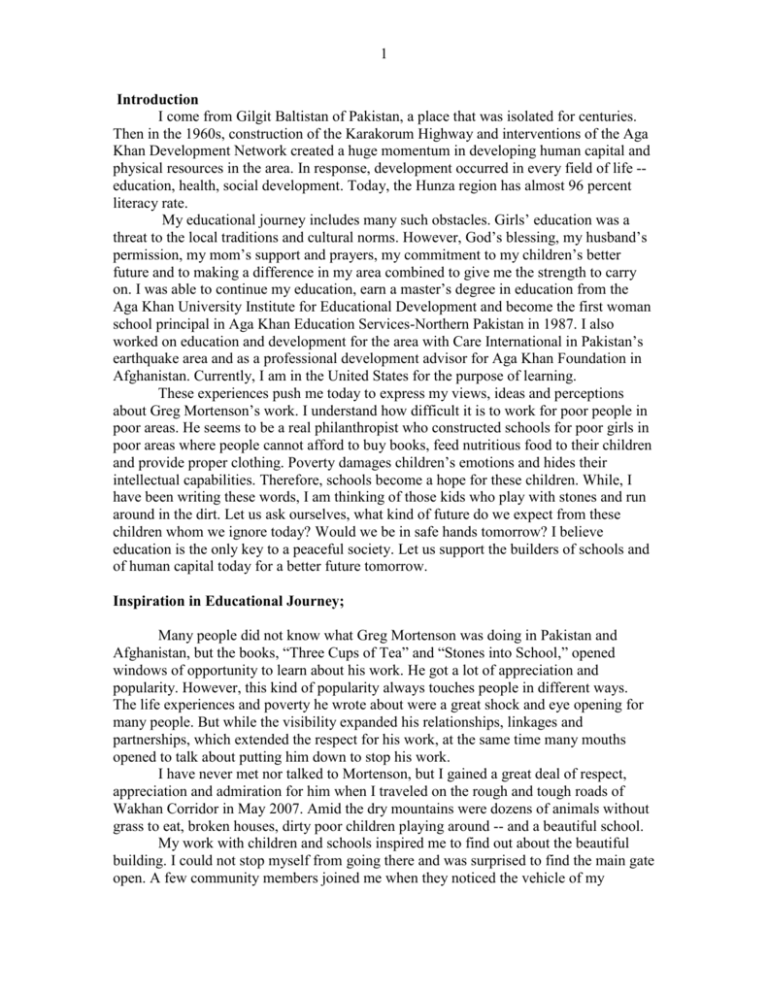
1 Introduction I come from Gilgit Baltistan of Pakistan, a place that was isolated for centuries. Then in the 1960s, construction of the Karakorum Highway and interventions of the Aga Khan Development Network created a huge momentum in developing human capital and physical resources in the area. In response, development occurred in every field of life -education, health, social development. Today, the Hunza region has almost 96 percent literacy rate. My educational journey includes many such obstacles. Girls’ education was a threat to the local traditions and cultural norms. However, God’s blessing, my husband’s permission, my mom’s support and prayers, my commitment to my children’s better future and to making a difference in my area combined to give me the strength to carry on. I was able to continue my education, earn a master’s degree in education from the Aga Khan University Institute for Educational Development and become the first woman school principal in Aga Khan Education Services-Northern Pakistan in 1987. I also worked on education and development for the area with Care International in Pakistan’s earthquake area and as a professional development advisor for Aga Khan Foundation in Afghanistan. Currently, I am in the United States for the purpose of learning. These experiences push me today to express my views, ideas and perceptions about Greg Mortenson’s work. I understand how difficult it is to work for poor people in poor areas. He seems to be a real philanthropist who constructed schools for poor girls in poor areas where people cannot afford to buy books, feed nutritious food to their children and provide proper clothing. Poverty damages children’s emotions and hides their intellectual capabilities. Therefore, schools become a hope for these children. While, I have been writing these words, I am thinking of those kids who play with stones and run around in the dirt. Let us ask ourselves, what kind of future do we expect from these children whom we ignore today? Would we be in safe hands tomorrow? I believe education is the only key to a peaceful society. Let us support the builders of schools and of human capital today for a better future tomorrow. Inspiration in Educational Journey; Many people did not know what Greg Mortenson was doing in Pakistan and Afghanistan, but the books, “Three Cups of Tea” and “Stones into School,” opened windows of opportunity to learn about his work. He got a lot of appreciation and popularity. However, this kind of popularity always touches people in different ways. The life experiences and poverty he wrote about were a great shock and eye opening for many people. But while the visibility expanded his relationships, linkages and partnerships, which extended the respect for his work, at the same time many mouths opened to talk about putting him down to stop his work. I have never met nor talked to Mortenson, but I gained a great deal of respect, appreciation and admiration for him when I traveled on the rough and tough roads of Wakhan Corridor in May 2007. Amid the dry mountains were dozens of animals without grass to eat, broken houses, dirty poor children playing around -- and a beautiful school. My work with children and schools inspired me to find out about the beautiful building. I could not stop myself from going there and was surprised to find the main gate open. A few community members joined me when they noticed the vehicle of my 2 organization, Aga Khan Foundation. They showed me the eight traditional rooms -including classrooms, staff rooms, washrooms -- and the courtyard in the middle of the star-shaped building. The building was a huge undertaking and I appreciated the creativity in integrating modern concepts with traditional Wakhan design. As I talked to the community leaders and explored the school, I learned an American guy, Greg Mortenson, had constructed the school. Initially, he considered and surveyed two villages, Chilkand and Sarhad-e-Broghil, but put the school in Sarhad because the other village already had a school and there was a danger of landslides from the mountain. However, it created jealousy. Nearby villages complained that Mortenson was a friend of Sarhad’s leader so he constructed the school there. As a result of the conflict, nobody was using the facility. Yet the Sarhad villagers and community leaders were grateful and appreciative of Mortenson's efforts and were looking forward to someone resolving this issue so their children could use the school. They were also frustrated that in the meantime their small children had to cross a river every morning to go to school in Chilkand; the childrens’ shoes and socks (usually broken shoes and torn socks) got wet and the children got sick and missed school. There was no health facility in the village. The head of the Sarhad-e-Broghil community, said, "Greg is a wonderful human being. Nobody can be like him. He has a great contribution for us. May God bless him.” He reiterated that CAI could not put the school in Chilkand due to landslides. A boy who had completed grade 10, making him the only educated child in Sarhad, said “The Government Education Department has not allowed us to use the facility so we cannot use it.” Later on I met with the provincial education director of Badakhshan, who told me, “Dr. Mortenson did not get our permission before constructing the school. So we do not allow the community to use it until we get permission from the ministry of Kabul.” I had to advocate to the provincial director saying, “What if Dr. Mortenson has not taken permission, does it mean that the building should be spoiled? Don't you think the poor children and the community would be happy if you allow them to use the facility?” This discussion seemed to be working. He agreed to write to the Ministry of Education and bring this issue to their attention. I also reported to my organization and recommended it intervene as a third party to resolve the conflict so the children could benefit from the school. When I met the provincial director again after two months, he said he had written about the issue to the ministry in Kabul and it was under consideration. In my recent discussion with colleagues from Afghanistan, it appears the Sarhad school is being used and CAI has constructed more schools in the Wakhan Corridor. Unfair attacks Then I came across the news about a special investigation into Mortenson’s work. Well, the word “investigation” made me very uncomfortable and I felt it a little harsh. It seems there is no recognition of anybody's good work. I really feel sorry for Mortenson because it seems unfair to a good human being, a philanthropist and a dedicated and hardworking person who started building schools based on his emotional attachment and personal financial contributions to poor people in Korphe. When he came back to the 3 United States empty handed, broke from giving it away, he had to sleep in his tent. Yet he is punished for creating schools and blamed because he chose the hard pathway in constructing schools for poor people in poor communities. I wish that every human being could demonstrate that kind of performance in these harsh areas of Pakistan and Afghanistan. If they did, we would have created peace, care, love for human beings, harmony, respect, tolerance and acceptance of each others' good work. We would have built and strengthened each other. These countries would not have remained poor. And the world would better understand the pain of those of us who walk the hard pathways of life. In recent years, 157 schools have been blasted in Pakistan. We need to ask those communities and those children how they feel without a school building. A school building secures children from the harsh weather conditions (extreme hot and cold) and provides social and emotional security that enables children to concentrate on their learning with a peaceful mind. We must salute this one man, for enabling thousands and millions of minds to focus on meaningful tasks -- education in schools. Why we are always focusing the negatives and becoming suspicious? There also seems to be a debate about CAI staff being less educated. It reminds me of an experience in my own village. At a social huge event, a well-educated young woman spoke English well. Others appreciated her language skills and scolded the old teachers for their lack of skills. One of the older teachers spoke (he was the first teacher in our village), with tears in his eyes: “If we had not initiated, struggled, faced difficulties with the traditional myths to educate girls many years ago, these men and women today would have not this quality and capability today. Need changes according to the time and realities, so if you cannot appreciate our work, please, do not dismiss us.” I learned a lesson that day. We cannot bring quality change all of the sudden without experimentation and change. The first step to change is accessibility, then quality and sustainability. Mortenson must have selected his staff according to the needs of the time. They must have worked hard and it must have worked well for them. Maybe he was not sure he would be so successful. Now CAI has expanded, so instead of blaming them, they should be told how to bring about further improvement in areas that are lacking and what strategies and approaches might be used Lastly, monitoring and evaluating every project is a significant part of any project. Every individual, group and organization experiments with different ideas, techniques and strategies. Every context has its own needs, so one has to deal accordingly. There is no fixed idea or concept. Mistakes are always a possibility; we learn from our mistakes. I would urge others to use soft language to evaluate CAI’s projects because there are rumors that one of the CAI staff had his life threatened in Pakistan. This seems a critical issue. As a human being, I am disappointed to learn that there is an investigation going on about Mortenson’s work. I think, why we do not appreciate good work? Perhaps a different approach can be explored, rather than blaming for the sake of blaming. And there should be no guilt for Mr. Mortenson. He should not question spending so many years working in the harsh, remote areas of Pakistan and Afghanistan. His self-esteem must remain high because he has created an environment where people can grow and develop as human beings. He is a demonstrator of peace. He needs to be respected, cared for and loved for his inspiring work. 4 For more information, contact: safida.begum2009@gmail.com 1. The Sitara School in Sadpara-e-Broghil. 2. The river children cross every morning to go to school. 3. The tall boy, left, is the only student educated through class 10.
